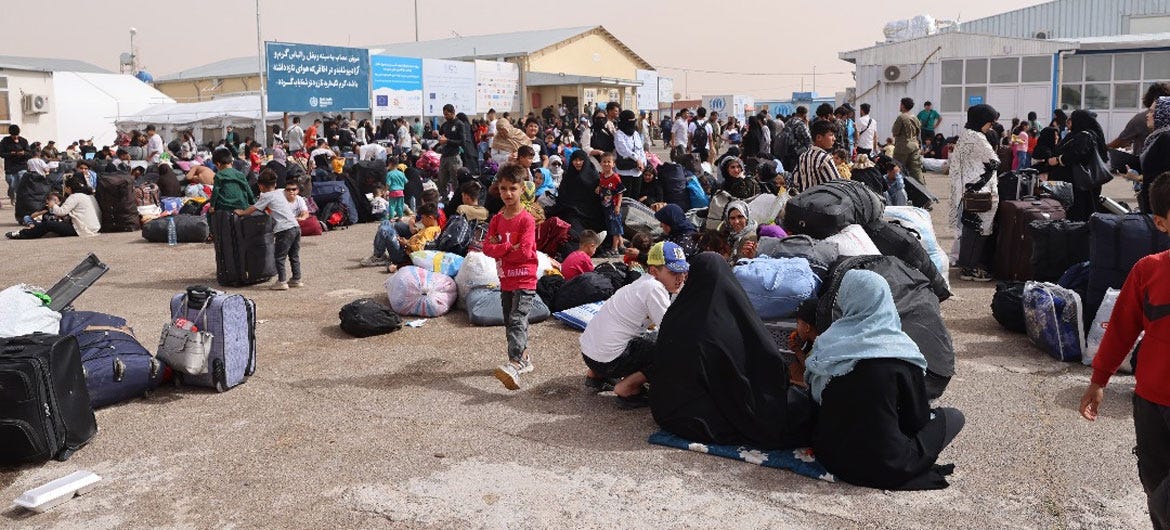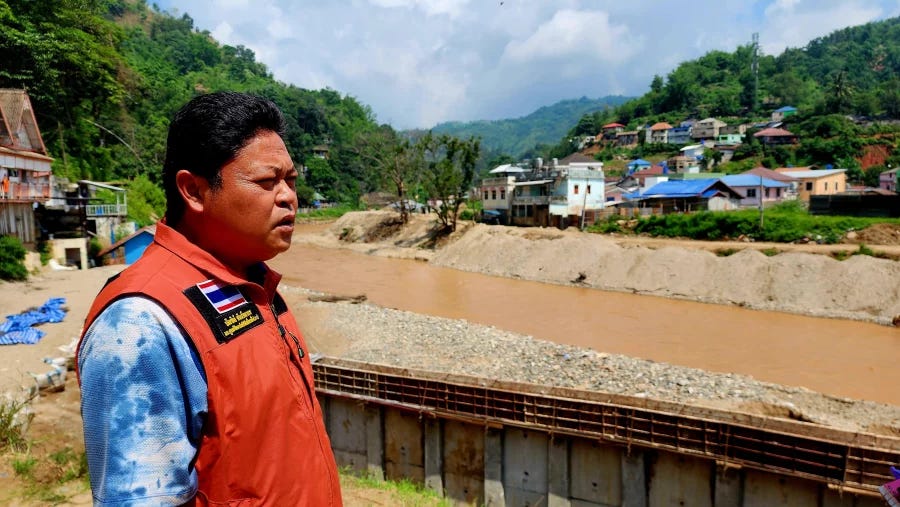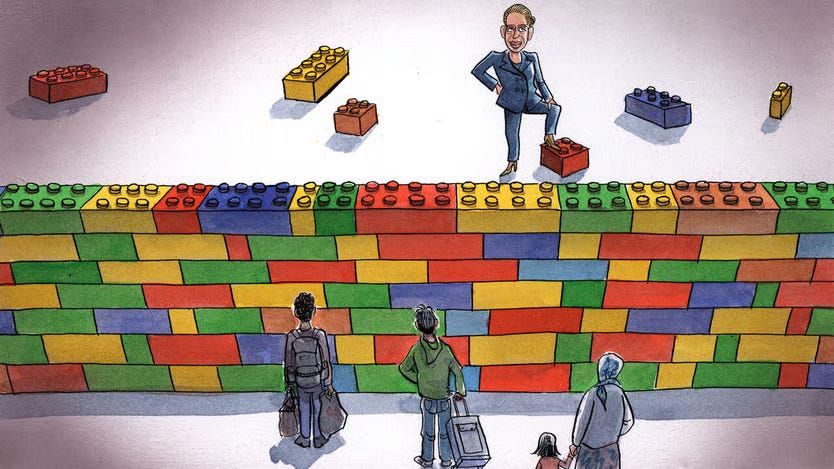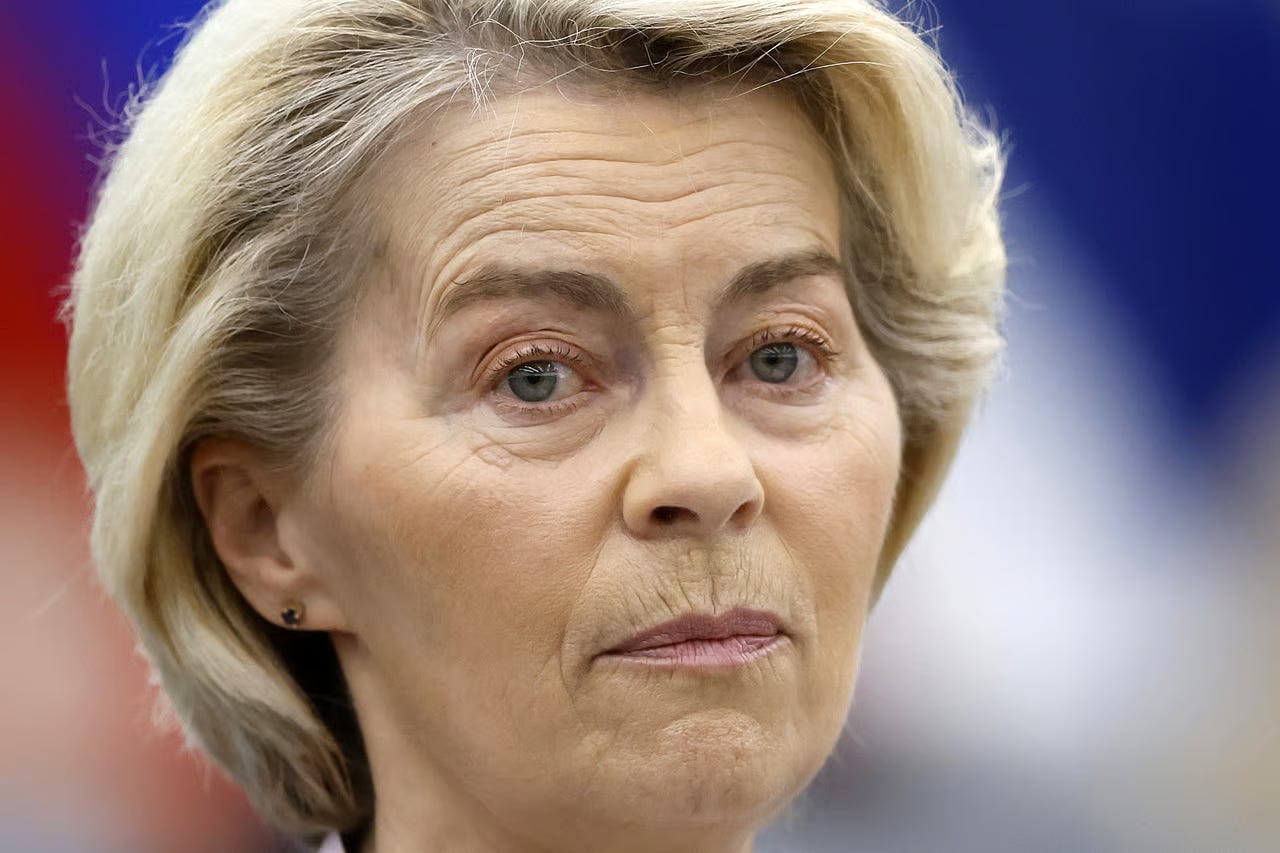Key Themes: Restrictive Immigration and Refugee Policy, Anti-Elite Rhetoric, Institutional Resilience, and External Interference and Geopolitical Leverage
What You Missed Ledger: Circa June 25’
1️⃣ ‘Desperate Afghan refugees return to an unfamiliar home’ - https://news.un.org/en/story/2025/07/1165377
Afghanistan is forced to take in millions of Afghans as Iran and Pakistan expel them from their turbulent borders. The United Nations Refugee Agency (UNHCR) has called for an orderly transition for the masses forced back into Afghanistan, a state that continues to struggle to find stability. Over 1.4 million Afghans have returned since 2024, raising fears of economic collapse and a greater humanitarian crisis. Women and children are especially at risk, with the Taliban government heavily restricting their rights and autonomy. Many returnees are effectively in refugee status, all facing significant risks upon return. Many of those returning are coming to a land unfamiliar to them, even if they are Afghan by birth. Millions had fled over the past years, with some children fleeing shortly after birth. Their inglorious return has left them in a state of panic, poverty, and restricted rights.
International organizations like the UNHCR have attempted to provide support and aid, but reports as of July find the agency has only 28% of the required funding as the world shifts away from humanitarianism. Various agencies across the UN, such as the UN Food and Agriculture Organization (FAO) and the UN Development Programme (UNDP), have expressed concern that public services and basic goods are below sustainable levels for a needy population. Local Afghan residents are already stretched thin, and the new mass influx of returnees only further strains the situation. Local residents have been described as generous and extremely open to assisting their new neighbors, yet much of this help comes at their own detriment.
This follows the UN General Assembly vote of 116 to 2 expressing ‘grave concern’ about the Taliban’s treatment of its citizens. The resolution has urged neighboring nations and donor countries to further support the economic, political, and developmental needs of the nation. With Afghanistan itself in a growing crisis, and neighboring nations experiencing further strain within their borders, what can outside actors do to assist the Afghan population? Which actors have the funds and means to do so?
2️ ‘In Myanmar, a rush for rare earth metals is causing a regional environmental disaster’ - https://www.npr.org/2025/07/12/nx-s1-5437955/myanmar-rare-earth-metals-regional-environmental-disaster
Myanmar’s civil war continues to rip through the nation, exacerbated by outside powers vying for influence and control. The crisis state of Myanmar has allowed opportunists to strip the land of precious rare earth metals, creating an environmental disaster alongside the political turmoil. Locals have begun to see their rivers and streams grow increasingly murky, prompting an investigation by the Department of Pollution Control. Arsenic levels were found to be over four times the recommended safe limit set by the World Health Organization (WHO), potentially cutting off vital water sources for local populations.
The Burmese people heavily rely on these water streams for both daily life and ritual, using them for everything from fishing to religious ceremonies. It is suspected that heavy mining in Shan State has caused pollution to trickle downstream, affecting populations in the south. Rare earth materials have become increasingly valuable, essential to vehicles, electronics, computer chips, and much of what modern-day society depends on. China holds a near-monopoly on many of these resources, making alternative sources highly sought after.
Rivers such as the Kok, the Sai, and the Mekong have shown unsafe levels of pollution, so severe that elephants are no longer allowed to bathe in them. The situation has been likened to the Wild West of 19th-century America, where civil conflict led to a vacuum of governmental oversight and regulation, particularly in the mining and extraction industries.
The Shan region is largely controlled by the United Wa State Army (UWSA), a group known for trafficking weapons and illicit goods. Shan State directly borders China, allowing local extraction operations to easily export materials into China for refinement and global distribution. Environmental regulations introduced by China in 2015 made many extraction methods untenable within its own borders, so Chinese firms have capitalized on neighboring nations that lack such codes. China is practically the only power with significant influence over the UWSA and the Shan region, and is therefore uniquely positioned to shape the future of its downstream neighbor.
There is hope that China will act responsibly and engage in constructive dialogue; however, few pressures exist beyond appeals to international goodwill. With the nation already torn apart by war, will environmental and civilian issues continue to be overlooked amid the political turmoil?
3️⃣ ‘Denmark’s left defied the consensus on migration. Has it worked?’ - https://www.economist.com/europe/2025/07/10/denmarks-left-defied-the-consensus-on-migration-has-it-worked
Denmark has diverged from the conventional left-wing policy of open migration in an effort to maintain national stability. Denmark’s Social Democrats under Mette Frederiksen have taken a stance on migration similar to that of far-right parties in other EU nations, such as the National Front (Le Pen in France) or the Brothers of Italy (Meloni in Italy).
The long-standing Social Democrats have implemented a rigorous social welfare system within the state, but have moved across the political spectrum on migration. Like many other Western states, Denmark was long a haven for refugees and dissidents. However, following the fall of the Berlin Wall and the Yugoslav wars of the 1990s, Denmark began a process of increasingly restricting unregulated migration. Further restrictions were imposed after the Syrian refugee crisis of 2015.
Denmark’s left has argued that migration would place a burden on the poor and that too many divergent values could change the nation’s identity. Refugees and migrants face a uniquely difficult time integrating into Danish society, with permanent residency and citizenship among the longest and most uncertain processes in the world. The left has used anti-migration rhetoric as a way to counter the right and maintain support for its public policies while appeasing right-wing sentiment.
The growing hostility toward immigrants has created a seemingly state-mandated “us versus them” dynamic within society. Immigrants are forced to assimilate to Denmark’s language and customs while facing the risk of marginalization and even expulsion.
Is this new stance against immigration something social democratic parties must adopt to pass the laws their constituents want? Or is abandoning the platform of multiculturalism fundamentally at odds with these parties’ core identities?
4️⃣ ‘In Brazil, Trump faces a country — and a leader — ready for a fight’ - https://www.washingtonpost.com/world/2025/07/10/brazil-trump-tariffs-lula-bolsonaro/
Brazil has set out to prosecute its former leader, Jair Bolsonaro, drawing the ire of Washington, D.C. American President Donald Trump has railed against Brazil and its current president, Luiz Inácio Lula da Silva, and is now threatening to impose a massive tariff on the nation over what he calls a political “witch hunt” against Bolsonaro.
As South America’s largest economy and one of the world’s most populous nations, Brazil is in a unique position to counter possible American threats. It maintains a largely closed economy, is a member of BRICS, and trades predominantly with China. Lula remains confident that his nation can withstand a possible 50% tariff imposed by the United States. While the U.S. is a significant trading partner—buying over $40 billion in Brazilian goods in 2024—it accounted for only 1.7% of Brazil’s overall economic output.
Other nations, such as Vietnam and Colombia, rely more heavily on U.S. trade and have been forced to make concessions to Trump’s demands. Lula, a historically popular figure in Brazil, has recently seen his support slip due to unfulfilled promises. Bolsonaro, meanwhile, is currently facing a 40-year prison sentence for inciting a failed insurrection, with Trump using tariff threats in an apparent attempt to shield his political ally.
Lula and his administration have remained firm, stating that Bolsonaro’s trials will proceed regardless of external pressure from the United States. Earlier last year, Brazil faced a similar threat from Elon Musk, who threatened to cut off access to X (formerly Twitter) after Brazilian courts moved to combat disinformation on the platform. Musk ultimately relented, allowing account bans to be enforced.
Will Trump follow a similar path and walk back his tariff threats, or will he remain steadfast in his support for his South American ally?
5️⃣ ‘How von der Leyen survived the no-confidence vote — by the numbers’ - https://www.politico.eu/article/ursula-von-der-leyen-parliament-europe-lawmakers-majority-greens-renew-politics/
Belgium saw European Commission President Ursula von der Leyen survive a no-confidence vote spurred by right-wing parties. A two-thirds majority is needed for such a measure to pass. There are 719 MEPs (Members of the European Parliament), yet only 553 showed up to vote. Of those 553 votes, 175 were in favor of the motion while 360 were against it.
Coming to von der Leyen’s defense were mainly centrist or centrist-adjacent parties, while her critics were largely from the periphery of the Parliament's political spectrum. Von der Leyen’s EPP, along with the Greens, S&D, and Renew, were overwhelmingly supportive, while most other parties backed the no-confidence motion.
There were 166 no-shows, whose absence appeared deliberate, as another vote took place minutes later in which 83 more MEPs participated. The largest share of abstentions came from the Left, with over half of their MEPs not appearing.
Support for von der Leyen, or lack thereof, was shaped both by country and by party affiliation. France, Czechia, Slovakia, and Hungary all had more MEPs voting in favor of no-confidence than against it, while Poland was evenly split among those present. Although five nations accounting for 130 million of the EU’s population did not end up backing von der Leyen, 22 member states still rallied behind the Commission President.
In Germany, von der Leyen’s home country, she received strong support, with 60 voting against the motion and only 21 in favor, and 11 abstaining. While the vote may have posed a temporary setback or challenge for the European Parliament, von der Leyen ultimately demonstrated that she retains broad support across the EU.
Will the recent no-confidence vote strengthen her position, or will it serve as grounds for further scrutiny?
Photo Credits:
Afghan families who recently arrived from Iran gather at a border crossing in Herat Province, Afghanistan. [Faramarz Barzin, UNHCR]
Bundit Pantarakon, a local businessman and city council member in Mae Sai, Thailand, looks over the Sai River. [(Michael Sullivan, NPR)
Illustration. [Peter Schrank, The Economist]
Luiz Inácio Lula da Silva of the Workers' Party speaks in São Paulo on Oct. 30, 2022, after being elected to a third term as Brazil's president. [Nelson Almeida, AFP/Getty Images]
Ursula von der Leyen on Thursday survived a vote of confidence in her leadership. [Guillaume Horcajuelo, EPA]









